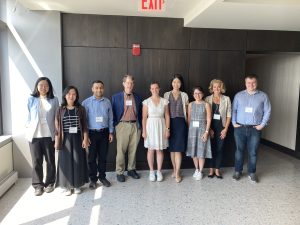Supported by a Nexus Award, the Ralph O’Connor Sustainable Energy Institute (ROSEI) recently hosted an event at 555 Penn Avenue (555 Penn) that brought together industry experts, regulators, researchers, and other stakeholders to discuss ways to create efficient and reliable power markets to support decarbonization efforts.

Hopkins contingent at the event, including (from left to right): Zhirui Liang, Ziting Huang, Saroj Khanal, Ben Hobbs, Muireann Lynch, Sijia Geng, Roshu Nateghi, Chiara Lo Prete, and Yury Dvorkin
The university’s Nexus Awards program supports university faculty collaborating on bold interdisciplinary innovations connected to research and programming to be conducted at 555 Penn, Johns Hopkins’ new center in Washington, D.C. The workshop, titled “Resource Adequacy with High Penetrations of Inverter Based Resources: International Experience, Analysis, and Impacts on Markets and Policy” was held on September 7. Organized by the Global Power Systems Transformation Consortium (G-PST), the event was jointly hosted by ROSEI and the Columbia University-JHU Future Power Markets Forum (FPMF)
“The goal of the workshop was to share international experiences of lessons learned and state-of-the-art methods and market designs to ensure adequacy,” said Ben Hobbs, ROSEI core faculty member in the Department of Environmental Health and Engineering, and FPMF co-founder.
The workshop was built on initial takeaways from two previous virtual events and included in-depth discussions, revision, and additions to conclusions. It was the first of several events that ROSEI will host in collaboration with the Forum at 555 Penn as part of its Nexus Award.
This workshop wasn’t the only activity the group hosted at 555 Penn as well: A G-PST committee met about “grid forming” inverter-based resources on September 7, and then the next day, G-PST’s Board held a meeting.
Hobbs said he was excited to welcome participants to Hopkins’ new facility at 555 Penn.
“It’s such a great setting, just down Pennsylvania Avenue from the Capitol,” Hobbs said. “The workshop was on the 10th floor of 555 Penn, and we had great views of the National Gallery and the Mall. So, it was never lost on the attendees that we were all in the center of the nation’s capital, taking part in energy policy discussions and debates that will shape the ongoing transition of the world’s power systems to supplies dominated by renewable energy-dominated supply.”
Hopkins will be working with the Consortium over the next five years on research to enable power system operators around the globe to reliably manage systems based mainly on wind, solar, and battery power. This coordination will be through the Electric Power Innovation for a Carbon-free Society (EPICS) center that JHU has established jointly with Imperial College London and the University of Melbourne with US National Science Foundation (NSF), UK, and Australian funding.